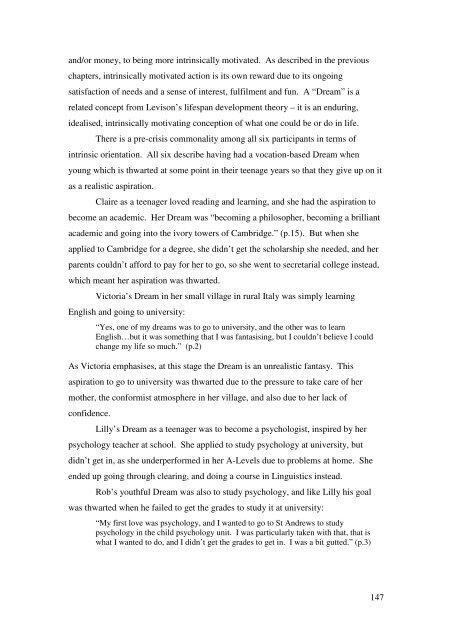DEVELOPMENTAL CRISIS IN EARLY ADULTHOOD: A ...
DEVELOPMENTAL CRISIS IN EARLY ADULTHOOD: A ...
DEVELOPMENTAL CRISIS IN EARLY ADULTHOOD: A ...
You also want an ePaper? Increase the reach of your titles
YUMPU automatically turns print PDFs into web optimized ePapers that Google loves.
and/or money, to being more intrinsically motivated. As described in the previous<br />
chapters, intrinsically motivated action is its own reward due to its ongoing<br />
satisfaction of needs and a sense of interest, fulfilment and fun. A “Dream” is a<br />
related concept from Levison’s lifespan development theory – it is an enduring,<br />
idealised, intrinsically motivating conception of what one could be or do in life.<br />
There is a pre-crisis commonality among all six participants in terms of<br />
intrinsic orientation. All six describe having had a vocation-based Dream when<br />
young which is thwarted at some point in their teenage years so that they give up on it<br />
as a realistic aspiration.<br />
Claire as a teenager loved reading and learning, and she had the aspiration to<br />
become an academic. Her Dream was “becoming a philosopher, becoming a brilliant<br />
academic and going into the ivory towers of Cambridge.” (p.15). But when she<br />
applied to Cambridge for a degree, she didn’t get the scholarship she needed, and her<br />
parents couldn’t afford to pay for her to go, so she went to secretarial college instead,<br />
which meant her aspiration was thwarted.<br />
Victoria’s Dream in her small village in rural Italy was simply learning<br />
English and going to university:<br />
“Yes, one of my dreams was to go to university, and the other was to learn<br />
English…but it was something that I was fantasising, but I couldn’t believe I could<br />
change my life so much.” (p.2)<br />
As Victoria emphasises, at this stage the Dream is an unrealistic fantasy. This<br />
aspiration to go to university was thwarted due to the pressure to take care of her<br />
mother, the conformist atmosphere in her village, and also due to her lack of<br />
confidence.<br />
Lilly’s Dream as a teenager was to become a psychologist, inspired by her<br />
psychology teacher at school. She applied to study psychology at university, but<br />
didn’t get in, as she underperformed in her A-Levels due to problems at home. She<br />
ended up going through clearing, and doing a course in Linguistics instead.<br />
Rob’s youthful Dream was also to study psychology, and like Lilly his goal<br />
was thwarted when he failed to get the grades to study it at university:<br />
“My first love was psychology, and I wanted to go to St Andrews to study<br />
psychology in the child psychology unit. I was particularly taken with that, that is<br />
what I wanted to do, and I didn’t get the grades to get in. I was a bit gutted.” (p.3)<br />
147
















